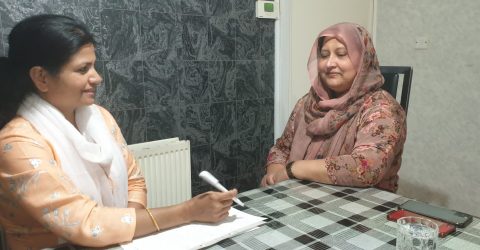
Empowerment of women and increased female participation in mainstream economic activities by ensuring equal access to quality education, economic resources and political participation as well as equal opportunities as men for employment, leadership and decision-making at all levels, are some of the major targets of the Sustainable Development Goal 5 among the 17 SDGs as pursued by the government of Bangladesh. Although women’s opportunities and public involvement has increased extensively over the recent decades, gender subordination and discrimination against women are still an entrenched epidemic in Bangladesh.
To understand gender subordination, we must understand what gender in fact means. Gender can be described as the socially constructed set of roles and responsibilities associated with being a girl and boy or women and men. It refers to the expected behaviour of men and women in a society. Hence, gender is nothing more than a concept imposed by society. Therefore, gender subordination is created when one gender is under the submission or the authority of another; and in most cases, it is the women under the subordination of men, which often results in women having less or almost no control over economic and other resources.
We see that in most cases, women are always the first victims of any inequality in a class-based and discriminatory social structure, and the patriarchal society of Bangladesh is no different. In our country, the inequalities and gender subordination faced by women have become social and cultural norms which often go unseen as being unjust and unfair. Although there is no systemic discrimination against women in the current legal system of Bangladesh, culturally and as a society we are far from being just towards the women in our country. The notion of women being inferior, weak, helpless and submissive perpetuates from the deep-rooted misogyny ingrained by the practice of patriarchy over the centuries.
In Bangladesh, the patriarchy results in a distribution of power and resources in our economy and within families such that men maintain power and control of resources while women are mostly powerless and dependent on men. According to Article 19, Section 3 and Article 28, Section 2 of Bangladesh’s constitution, women and men are recognised to be equal and it has been said that the state shall endeavour to ensure equality of opportunity and participation of women with men in all spheres of national life. But patriarchy impedes women’s constitutional rights and is considered to be the main obstacle to women’s development and empowerment in our country.
Some of the most common forms of subordination and discrimination faced by the women, especially the current young generation of women in Bangladesh are as follows:
• Lack of family support and backup:
The family, the basic institution in a society, is the most patriarchal in our country. The hierarchical relations in most families set the men at the top and the women at the lowest. The idea of men being assertive and dominant while women should be submissive and compromising starts from within the family.
Even in this modern era, most families view their daughters as a burden that is to be married off from their shoulders to the in-laws. Since the daughter is considered to be a temporary member of the family, in most cases her education is not viewed to be as important as that of a son’s.
The financial investment in the higher education of a daughter is deemed to be a mere unnecessary expense in most families. In some cases, a daughter is allowed to pursue higher education only so that she can be married off to a desirable suitor of higher social status.
• Cultural and social norms:
In our country, it is expected of a woman to be a dedicated wife and a mother instead of building a career. Even if a woman does choose to have a career and be independent, she is still expected to prioritise her family and take all the responsibilities of raising her children and maintaining the home all by herself. The norm is for the man to be the provider of the family while the woman is the nurturer under his authority.
A modern independent woman who chooses to priorities herself and stand up against gender discrimination and subordination is often seen as “everything that is wrong with the modern society”.
• Sexual harassment:
One of the most evident forms of gender subordination that young women face is sexual harassment. There is no doubt that the crimes such as sexual harassment and assault are results of the misogynistic mentality of our patriarchal society. These are not the crimes of desire but of power. It is a way men exert their power over women. Although we believe our country to be progressive in the recent years, yet cases of sexual harassments are very common especially in places of education and work. And in most cases, the victims are afraid to come forward in protest in the fear of humiliation and defamation. Also, there is a common culture of victim blaming which further makes women powerless and encourages such abuse in our society.
• Prejudice in the education system:
Stereotypically, female students are discouraged from pursuing STEM subjects such as engineering, neuroscience, and applied physics etc. which are still considered to be the domain of men. Also, in some cases male students are prioritised when it comes to project leadership or research opportunities as it is commonly perceived that a female student might not be as committed as a male student due to factors such as family, the inability to work late hours, transport issues etc.
• Housing problem for female students:
Many women cannot pursue higher education due to housing crisis. Most of the higher educational institutions in our country do not have required housing facilities for female students, which hinder the access of women to quality education. For example, it has come to light in a very recent case that Dhaka University had a law that restricted married female students’ stay in residential halls while male students had no such restrictions. Although the law was later abolished by the authorities of Dhaka University due to heated protest from the students, it is still a prime example of how women face discrimination even in educational spheres.
• Prejudice in terms of healthcare:
The discussion on menstruation is still considered a taboo in our country and there is a lack of awareness surrounding this very natural process among the population. Painful periods are still not considered to be a valid reason to skip school or a day at work. Also, young unmarried women are often stigmatized by doctors and the society for being concerned about their reproductive health, which points out the social perception that a woman should only be concerned about her reproductive and sexual health only when it involves or bothers a man.
For many of these reasons, young women in our country are still lagging behind in terms of advancement and development compared to the women of the western world. These obstacles also stand in the way of young women pursuing higher education compared to their male counterparts. Even though female students are ahead in primary and secondary education compared to male students, the number decreases drastically when it comes to female enrollment in universities. And as we know quality education is the most important prerequisite that ensures the empowerment of a woman in today’s world.
With half the population being female, it is crucial and necessary for us as a nation to overcome these issues surrounding gender subordination and discrimination against women for a better future that we all dream of and hope for. Because women are strong, powerful and invincible, and it is about time that the world perceives and acknowledges women not only as who they are but also as who they can be.
The writer is a student of BRAC University



